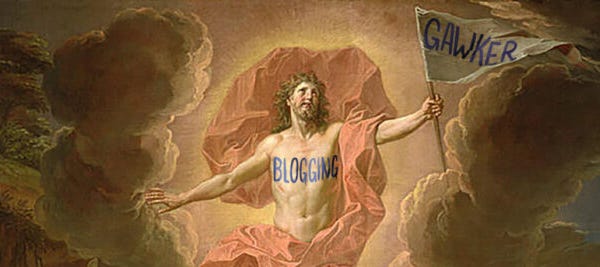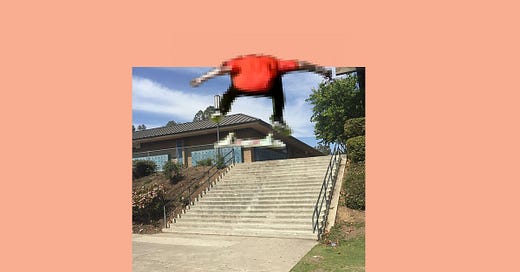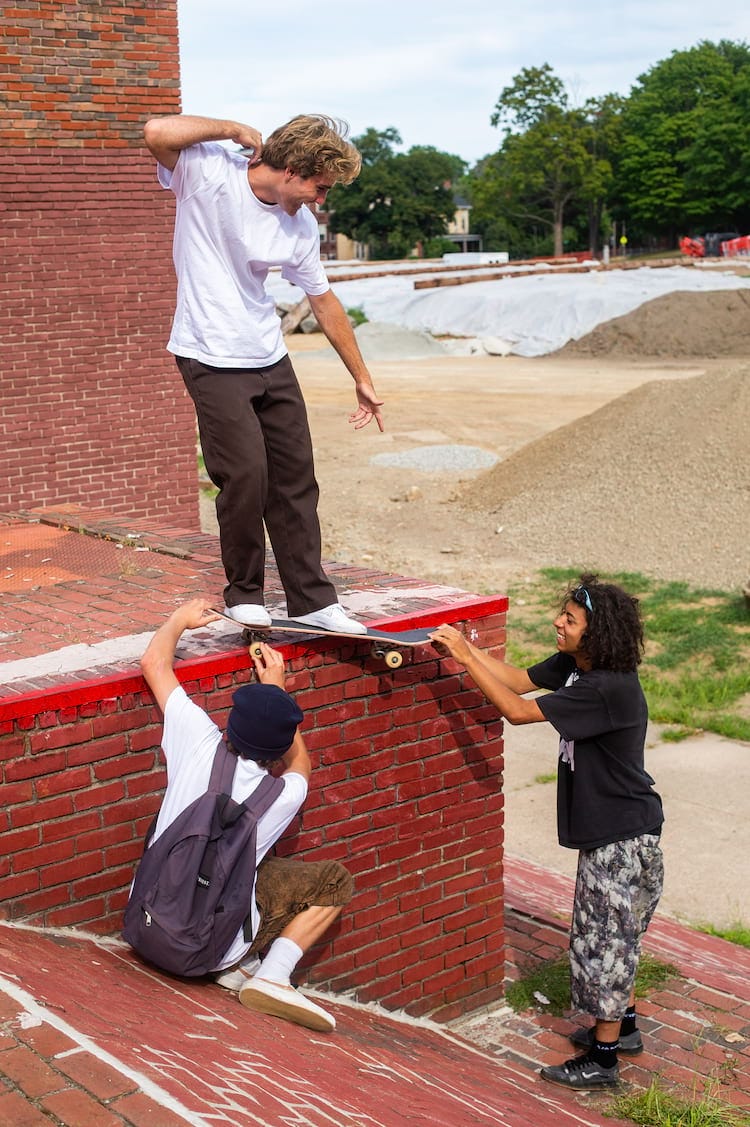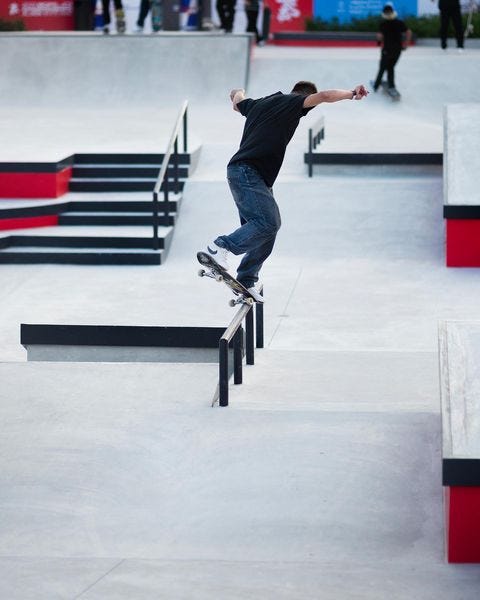The definitive weekly ranking and analysis of all the skateboarding and other online things that I cannot stop consuming and how they make me feel, personally.
AMs scrambled, showcased
Rank: 1
Mood: 🥚 🍳
Thrasher Magazine’s “Am Scramble” is good. Not a terribly bold stance to take, I realize. But in an era where the regular spate of monthly skateboarding magazines is no more, where each of those issues—through interviews, checkouts, tour articles, etc.—was designed to highlight and provide insight into PRO and AM skateboarders alike, having something like “Am Scramble” to fill that promotional void is invaluable.
For the promising AM, the full-suite of promotion it offers has shown to be a relatively successful springboard to a career in professional skateboarding. If we’re unfamiliar with a skater, the “Meet The Scramblers” videos help establish their personalities. Then we see them on board and in action in the “Am Scramble” edits themselves. Learning that Max Wasungu is a certified Silly Little Guy in the interview made his approach to skating in the edit that much more enjoyable.
The extended “Am Scramble” follow-up interviews that Thrasher posts online afterwards also do a solid job of expanding on the skaters’ time on the trip and usually give us a better idea of who they are as people and their experiences in the industry. As mundane as they can be at times, it’s these insights that help an audience build a connection with a skater outside of their actual skateboarding—and can even subvert our preconceived notions of a person. While most of us know Dylan Jaeb as a once-ubiquitous Instagram prodigy, his interview shows us that he’s become a pretty level-headed kid who continues to grapple with growing up and through social media.
I think brands put a lot of pressure, especially ’cause that’s kind of like what—I don’t wanna say why they found me or why they put me on is because of social media, but it is kind of a big part of it. And so it’s like they do kind of put a bit of pressure on me to do a certain amount of posts. Not really pressure, but it’s like they expect a certain amount from me because that’s what I’ve been doing my whole life.
Sure, skaters getting labelled “Scramblers” by Thrasher for the rest of eternity may feel a bit silly, but “Am Scramble” is one of the best efforts to platform and support up-and-comers in recent memory.
To watch or not to watch (or watch but feel weird about it)
Rank: N/A
Mood: 🐵 🙈
The Paris 2024 Olympic Skateboarding qualifiers are underway in Sharjah, UAE. The athletes are presumably within the confines of their protective “golden fence,” and as many Instagram posts have shown us, they’re currently going off. As a viewer, it’s a bit of a moral quandary. I want to watch the skaters compete because I’m one of those sick bastards who enjoy competitive skateboarding. But, as I wrote about a few weeks back, these events are taking place in Sharjah over the objections of World Skate’s (skateboarding’s Olympic governing body) own Gender Equality Commission. In a letter to World Skate leadership, the GEC raised concerns about the UAE’s criminalization of the LGBTQIA+ community.
Under penal code articles 356, 359, and 177 of the UAE civil code, being transgender and/or engaging in homosexual behavior are criminal offenses. Punishments range from deportation and monetary fines to 10 years in prison and even death.
Many athletes that would be selected to participate in this vital qualifier for Paris 2024, are also members of the LGBTQIA+ community. By hosting the World Championships in the city of Sharjah you have created a scenario where LGBTQIA+ skaters as well as their families, fans, and event support staff (among others), would not be able to take part in this event safely or legally.
Those concerns went unheeded and World Skate moved ahead with the events, leading some staff and skaters to not participate in or attend them at all, which I imagine is devastating for those folks who’ve committed so much time and energy to this endeavour. For their part, World Skate would eventually respond to my story, telling me that things would be fine and making sure to let me know how big and sick Sharjah’s new skateparks are.
So what do you do if you’re a fan of competitive skating but not a fan of how World Skate is running things and how it treats athletes and staff? Watch? Not watch? Watch, but quietly and through splayed fingers with an overwhelming feeling of guilt?
Ahead of the World Cup in Qatar, sportswriter Ryan Rosenblatt touched on the moral dilemma of watching the games for SBNation.
The reality of 21st century society is we are all constantly asked to draw moral lines, but then we are almost obligated to step over at least some of them for survival or comfort. So then we draw a new line—what can we live with, or find some joy in.
Maybe you won’t watch the World Cup because it is a product of and outlet for harm. Or maybe you’ll do so uneasily. Maybe you’ll know it’s a compromised event, but you can put it aside and enjoy all 64 games.
None of those choices are wrong. Hell, maybe none of them are right either.
The one thing you can do is be honest about the situation.
Recognize the bribery and the lives lost. Be honest about the oppression legalized within Qatar’s borders and how it is being mainstreamed through this event at great harm. Confront the racism and anti-Muslim sentiment that plays a role in the criticism. Be cognizant of the long history of ill the World Cup has brought countries before and will bring in the future, potentially in your own city.
Much of the same is true about the Olympics and how the IOC chooses host countries, how it treats those host countries, and the damaging effects the games have on local communities. That’s without mention of the ill-treatment athletes themselves can face. World Skate ignoring its GEC’s concerns for what we can assume is a hefty paycheck is just an echo of that ethos. So, as a fan, if this is something that weighs on you, what should you do? It’s not a clean 1:1 or a tidy answer, but Rosenblatt closes his piece with this:
What you do from there, be it watching and cheering or abstaining and protesting —hopefully it comes from a place of honesty and puts you in a place where you can proceed with as much peace of mind as possible. It’s the best we can do when the world hands you such evil, this time at an unprecedented level wrapped in an event billions hold so dearly.
Mikey, whatchu up to?
Rank: Oi
Mood: 💵 🏗
Thousand Oaks, California, city council member and co-president of a private equity real estate firm, Mikey Taylor, recently nominated Marcella Ketelhut as Thousand Oaks’ Planning Commissioner. Ketelhut, whose Instagram bio says she’s an “Attorney | Vineyard/Winery Owner | Real Estate Broker…,” would go on to be voted into the position by the council last week. At the risk of being too presumptuous, she sounds like someone who’s in touch with everyday folk and will look out for their best interests when it comes to the city's development going forward!
Her Sotheby’s International Realty page also claims that each sale she and her realtor partner make “also serves the community, as 10% of commissions are donated to local law enforcement [emphasis mine], youth, and environmental causes both in Ventura and Los Angeles counties. Cool! The LAPD certainly does have a rich tradition of community outreach.
Also, (despondent) lol:
BailGPT
Rank: 1…
Mood: 🤖




Now, you might be thinking, what is this niche Alberta politics tweet doing in a newsletter that’s ostensibly about skateboarding and the internet’s various goings-on? Well, I’d contend—and hell—even portend that we’re not far from a strange AI-related gaffe taking place in skating’s little corner of the world.
Bail shots—a published photo of a skateboarding trick that isn’t of the trick attempt that was landed or is of a trick that was never landed at all—have long been a staple of skateboarding lore. With the advancements in generative AI and augmented reality—especially in apps like Geenee AR that combine those technologies to allow you to do everything from digitally change your outfit to hurl characters of your choosing through the air in augmented reality—it’s only a matter of time before someone tries to rectify a bail shot by constructing a fabricated AR clip of themselves riding away from a maneuver they never actually did.
Perhaps with this technology, a skateboarder could even retcon themselves out of a lie that’s followed them for years. Imagine at some point a “lost hard drive” is “recovered,” and on it is “footage” of Ryan Sheckler’s “backside flip down El Toro” that he claimed to have landed all those years ago. He did eventually admit to his lie, but that’s an easy workaround. I’ve even done the courtesy of scripting out a statement for Shecks:
“Bro, I know, it’s crazy. So I actually went back to El Toro ‘cause I wanted to prove to myself and all of my fans that I could really do it. The backside flip. And I did, bro! God was with me that day. Only took three tries. But, and this is the craziest part, the filmer lost the hard drive with the clip on it! Wild! We fired him after that. He hasn’t worked in the industry since, don’t bother looking him up.
Anyways, I couldn’t tell anyone I did it after the footage got lost—no one would ever believe me! Then a couple of weeks ago I was at Danny Way’s house and he was cleaning out his garage. Under this big stack of deadstock Plan B boards was an old box of junk that had the hard drive in it! So crazy, bro.”
Believable, no? Uncanny, yes?
Kings > Soldiers
Rank: 2
Mood: 💸

“[I] tried to teach ‘em how to be kings, but all they want to be is soldiers” is the perfect P-Rodism. It’s just the right combination of pseudo-inspirational aphorism and hustle-culture mumbo jumbo. But that comment is actually the button on a rather interesting thought. In his “Paul Rodriguez breaks down his ‘Me, Myself & I’ part” video from The Nine Club, Rodriguez talks about how that video part was the first solo effort to be released for purchase on iTunes. Earlier that year (2010), Shane O’Neill’s pro debut part for Skate Mental debuted on The Berrics with a price tag attached, both releases ruffling some feathers for doing so at the time.
But as Rodriguez saw it, this model was a viable way to help skaters and filmers get paid, as video content was more and more often getting dropped straight to the web.
“I wanted to try something new that’d never been done—and it worked. But then everybody else wasn’t patient enough or wasn’t trying to follow along with this program and just… let their footage all get put out for free, which, whatever, there’s no right or wrong, but I’m just saying for those of you who don’t know: for most pro skateboarders, it’s hard out here.
With sponsorships and making a living and being able to survive off being a pro skateboarder—[for] most pro skateboarders, it’s tough. This was another idea I had… to create another lane for people. [I] tried to teach ‘em how to be kings, but all they want to be is soldiers.”
While the pay-to-play model might have only worked for names as big as Rodriguez and O’Neill, the way we consume skateboarding content now—primarily for free and often only once—has never appeared to be a strong financial alternative for those pursuing a career in professional skateboarding who spend years and risk their livelihoods to make said content. The exchange rate between “likes” and dollars is grim.
Something to consider:

True thing:
Good thing: Local radio.
Bad thing: RIP Nu Gawker. It’s been a bleak few [months/years/decades] for the “viability” of quality writing on the internet.


Until next week… if you wake up early enough—just on the edge of dawn—that’s when you’ll hear the birds’ most honest conversations. Their cheeping and twittering at your feeder are as animated as you’d expect a private talk between friends to be. What they’re saying isn’t clear, or our business, but if you close your eyes, it can feel like the din of a crowded diner. That sacred time when we all lose ourselves over a meal, succumbing to that hallowed interspecies tradition of bullshittin’ with your buds.


















